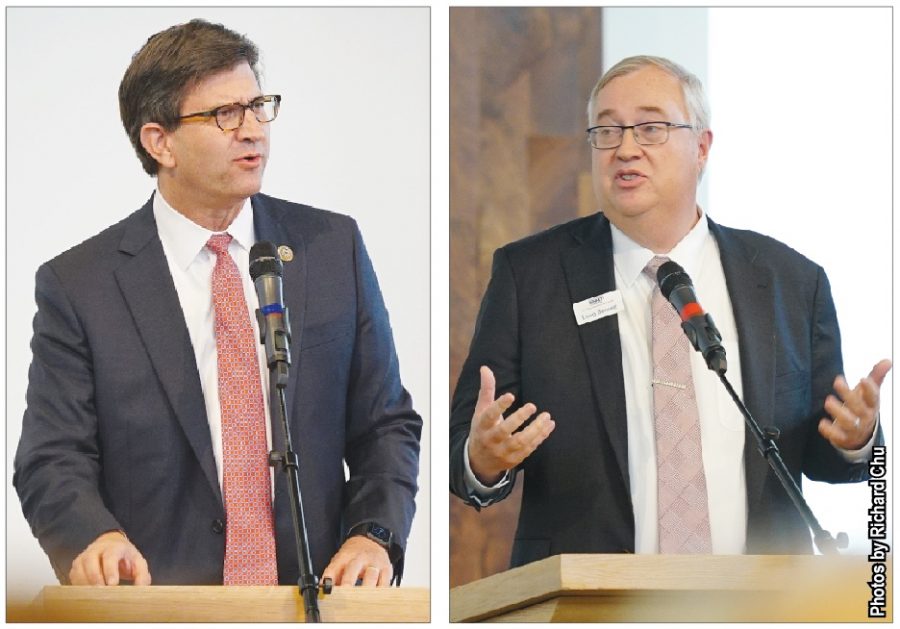2018 midterms engage students in politics
Congressman Brad Schneider, D-Ill. (left) and Republican opponent Doug Bennett deliver speeches at the North Shore Jewish Community Candidate Forum on Oct. 14. As the election date has approached, students have found ways to be involved in these political races such as interning for candidates. Photos by Richard Chu
A sign endorsing the National Rifle Association is one example of a red flag for senior Jack Stewart while canvassing for a Democratic political campaign. When Stewart ended up at the house of the current officeholder who his candidate was running to replace, he found himself facing another warning signal.
“I asked, ‘Do I have to knock [on] this door?’ and the field organizer’s like, ‘Yes, you have to ask.’
“I walk up to the door, and luckily the [incumbent] didn’t answer, but the wife answered, and she was like, ‘Yeah, no, leave,’” Stewart said.
In addition to working on political campaigns, students are discovering numerous ways to become more involved prior to the Nov. 6 midterm elections, according to Chelsea Costello, national program manager for Inspire U.S. The nonpartisan organization supports high schools in conducting voter registration activities. Student approaches to political involvement include advocating for or rallying against controversial issues like gun control, attending marches promoting voter registration, frequenting candidate forums and discussing hotly contested political races with peers.
In a phone interview, Costello said some factors contributing to increased student political involvement following the 2016 presidential election are the expansion of political campaigns’ marketing via social media, easier online access to voter registration and the national conversations following tragedies like the Parkland, Fla. school shooting.
“It’s not just that young people can have an impact in the future, they’re having an impact now.
“Because [students] have so much power, people in elected offices and people around the nation are starting to realize, ‘We need to take young people seriously,’” Costello said.
Barrett Davie, Illinois Senate 29th District Republican candidate, said in a phone interview that he has benefited from having high school students on his campaign because they can reach more people through canvassing, allowing him to talk directly with voters.
“With students working on our campaign, it’s been fun to watch them grow as well, because you’re going out and you’re talking to people every day,” said Davie. “Those people on the other side of the door may not react well to your message or even your label, and you’ve got to learn how to … engage in a conversation and … get them to have an open mind.”
According to junior Araya Dhiensiri, joining State Rep. Jonathan Carroll, D-Ill.’s campaign this year has deepened her longtime passion for politics and has emphasized the importance of getting all students involved leading up to the 2018 midterms.
“Before, I just did nothing about [political issues],” said Dhiensiri. “I would … see things on Instagram, and I’d be very angry about them, but I didn’t know what to do about it. … With this internship, I feel like I can finally make a difference instead of just sitting and being angry about things that I thought I couldn’t change.”
Another opportunity for student civic engagement is becoming an election judge, said Edgar Leon, high school coordinator for the Cook County Clerk’s office, in a phone interview. If a student is a high school junior or senior, has at least a 3.0 GPA on a 4.0 scale and submits a consent form signed by the student’s principal and parent or guardian, he or she is qualified to serve as an election judge. Some responsibilities of the position include setting up a polling place, providing voters with access to a ballot and answering questions they may have on Election Day. After attending training days and working on Election Day, election judges earn $200 for their efforts.
“I think the vast majority of students come away with a greater understanding of what Election Day looks like, what being an active voter or citizen looks like, and the vast majority of them … say they’re more inclined to register to vote and to go vote when they’re eligible,” Leon said.
According to Costello, national political discussions leading up to the 2018 midterm election cycle have brought society to a “tipping point.”
“What is decided in the 2018 midterm election, I think we’ll feel the weight of its effects … more than what an average person has felt after an election before,” said Costello. “The 2016 election did that for a lot of people. More now than ever, as a young person, even if you aren’t naturally civically engaged, I think this midterm election … will really impact the focus on getting young people involved.”


